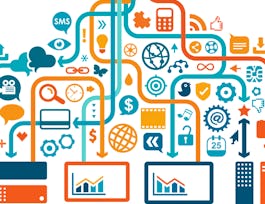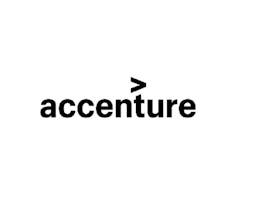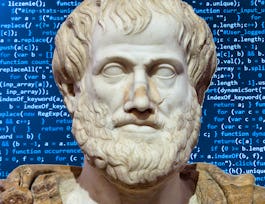You might already know that data is not neutral. Our values and assumptions are influenced by the data surrounding us - the data we create, the data we collect, and the data we share with each other. Economic needs, social structures, or algorithmic biases can have profound consequences for the way we collect and use data. Most often, the result is an increase of inequity in the world. Data also changes the way we interact. It shapes our thoughts, our feelings, our preferences and actions. It determines what we have access to, and what not. It enables global dissemination of best practices and life improving technologies, as well as the spread of mistrust and radicalization. This is why data literacy matters.



Data Literacy – What is it and why does it matter?



Instructors: Morten Misfeldt
Sponsored by EdgePoint Software
9,992 already enrolled
(108 reviews)
Recommended experience
Skills you'll gain
Details to know

Add to your LinkedIn profile
9 assignments
See how employees at top companies are mastering in-demand skills


Earn a career certificate
Add this credential to your LinkedIn profile, resume, or CV
Share it on social media and in your performance review

There are 3 modules in this course
If you use Google and have a look at your Google Dashboard you will probably be amazed by how much data this company has collected about your online activities. Now think about all the other internet services, social media sites, and databases that may have a file on you, your health, your actions and inclinations. In this module, we will explore user tracking and information harvesting, define personal data and discuss the limits in managing your personal data disclosure. Consequently, we will present the legal framework for data protection and processing.
What's included
4 videos9 readings3 assignments2 discussion prompts
In this module we expand on Module 1 by looking at how networked data and algorithms affect the way we see the world. From global dissemination of best practices and life improving technologies to the spread of hate and radicalization, we trace the mechanisms by which data-driven technologies can add value to people’s lives, and how they can exploit human vulnerabilities.
What's included
3 videos6 readings2 assignments3 discussion prompts
Big data and novel computational methods have revolutionized the way we create knowledge. We will show by example how this knowledge is used and what it implies for the future of humanity. We look at AI-research, computational social science, machine learning and education, and through these examples, we will try to cultivate a deeper understanding of how data-driven technologies are shaping the social fabric, how they augment human capabilities, and may improve our stewardship of spaceship earth.
What's included
6 videos12 readings4 assignments2 discussion prompts1 plugin
Instructors

Why people choose Coursera for their career




Learner reviews
108 reviews
- 5 stars
74.31%
- 4 stars
21.10%
- 3 stars
4.58%
- 2 stars
0%
- 1 star
0%
Showing 3 of 108
Reviewed on Nov 24, 2022
This course is really a awareness course regarding how to take care of personal Data as well as professional data.
Reviewed on May 5, 2023
I enjoyed this course as it hit on some key aspects I desired, such as machine learning (and unintended biases) and use of data algorithms to solve societal problems.
Reviewed on Jul 6, 2022
The couse help sin identifying real data and managing it
Recommended if you're interested in Social Sciences

The University of North Carolina at Chapel Hill

The University of Sydney

Accenture

University of Colorado Boulder

Open new doors with Coursera Plus
Unlimited access to 10,000+ world-class courses, hands-on projects, and job-ready certificate programs - all included in your subscription
Advance your career with an online degree
Earn a degree from world-class universities - 100% online
Join over 3,400 global companies that choose Coursera for Business
Upskill your employees to excel in the digital economy


















